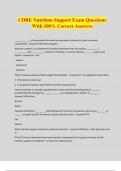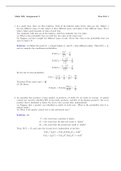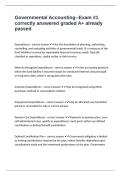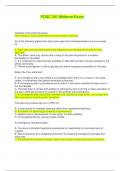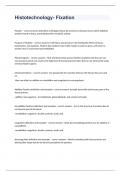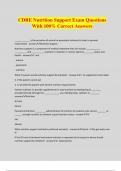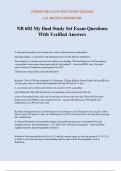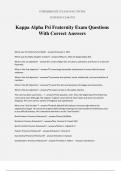applications
2021-2022
1
,Table of contents
Chapter 1: Cell based DNA cloning p. 3
Chapter 2: Expression cloning p. 20
Self study new cloning techniques p. 28
Chapter 3: PCR p. 33
Chapter 4: Model organisms comparative genomics evolution p. 42
Chapter 5: Next generation sequencing p. 56
Chapter 6: Copy number variants p. 63
Chapter 7: Pharmacogenetics and genomics p. 72
Next generation sequencing (techniques) p. 87
2
,Cell-based DNA cloning
Cloning means you will amplify nucleotid acids. Cell-based DNA cloning → Clone in cells. Can also clone in
vitro → In glass tubes cloning like PCR.
1. Principles of DNA cloning
Cell based DNA cloning comprises 4 steps:
1) In vitro construction of a recombinant DNA molecule
2) Transformation
• Recombinant DNA molecule will be introduced into a host cell and will then be grown. Specific
markers will be used.
3) Selective propagation of clones
4) Isolation of recombinant DNA clones
• This step isn’t always included in the cloning process. Depend on what you want to do with the
recombinant DNA clones
1.1 In vitro construction of a recombinant DNA molecule
In vitro construction of a recombinant DNA molecule requires cutting and pasting of DNA
• Restriction endonucleases = scissors, cuts DNA
• DNA ligase = glue, ligates DNA back together
This requires a replicon (replicon is specific for a host). A replicon is a piece of DNA that makes independent
DNA replication possible
= when you put your recombinant DNA molecule in host it hast to be present in host and remain in host
that is important
Usually a construct called “vector” is used, containing many features used in the cloning process.
• Contains replicon, and other things needed for DNA replication e.g. ORI. ORI : origin of replication
(will be passed on to daughter cells!).
Plasmids are used most often as a vector = classical approach. Plasmids are circular DNA molecules in
bacteria. Target DNA can be ligated into the vector → Create recombinant DNA molecule containing your
target DNA sequence.
1.2 Transformation
A recombinant DNA molecule is introduced in a host cell → Usually bacterium or yeast (or human cell lines)
• Easy to grown (Grow overnight: get millions of bacteria)
• Fast reproduction
When a recombinant DNA molecule is used for expression studies, cloning is often done in eukaryotic cells
(mammalian cells, insect cells, see later in this chapter). Usually, cloning in a bacterium precedes cloning in
the host used for expression.
3
, For the expression study itself bacteria aren’t often used because human proteins are too big, folded
wrong, not expressed,…. This is why eukaryotic cells are used for expression studies. However, cloning
before this expression study is often done in bacteria.
Recombinant DNA and host cells will be mixed together → Need to make the host cell compatible so it can
take up the recombinant DNA.
1.3 Selective propagation of clones
Cells are plated on agar (contains sugar) → Each individual cell forms a colony
• Each colony is a clone: All cells are identical, and have the same ancestor cell
• 1 colony can be grown in liquid medium to obtain more cells
Vector often contains an antibiotic resistant gene. The antibiotic will be added to the agar. Only cells
containing the vector will be able to grow on the agar plate because they contain a antibiotic resistance
gene.
Agar plate on the left: contains to many colonies → Cells can’t grow
anymore. Will create small colonies which can’t grow any bigger.
Agar plate on the right: colonies still have space to grow! Will create
bigger colonies.
Each colony comes from 1 cell → All cells in this
colony are identical!
1.4 Isolation of recombinant DNA clones
The recombinant DNA is purified from
the cells
Need to isolate recombinant DNA clones
when you need the for further studies →
Via cell lysis and purification
The recombinant DNA clones are easy to
separate form the bacterial genome because they’re much bigger.
4

